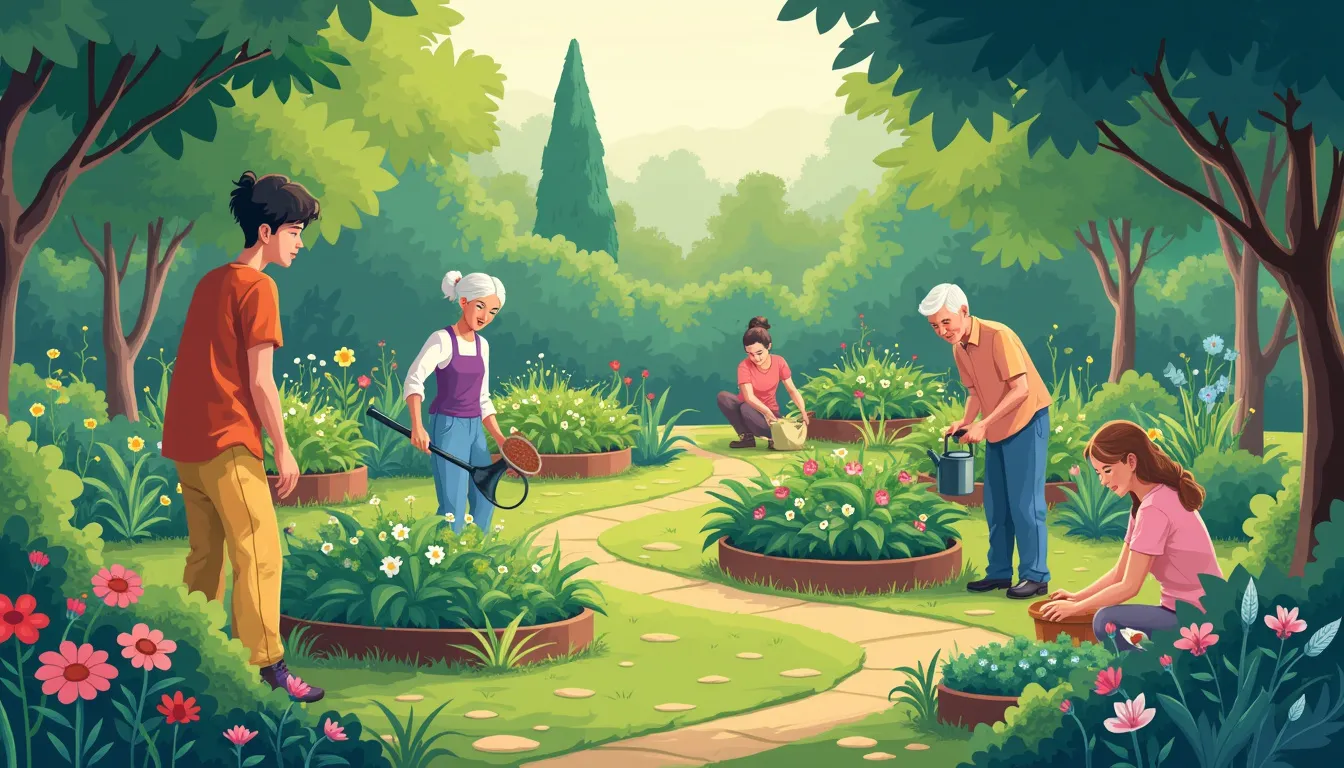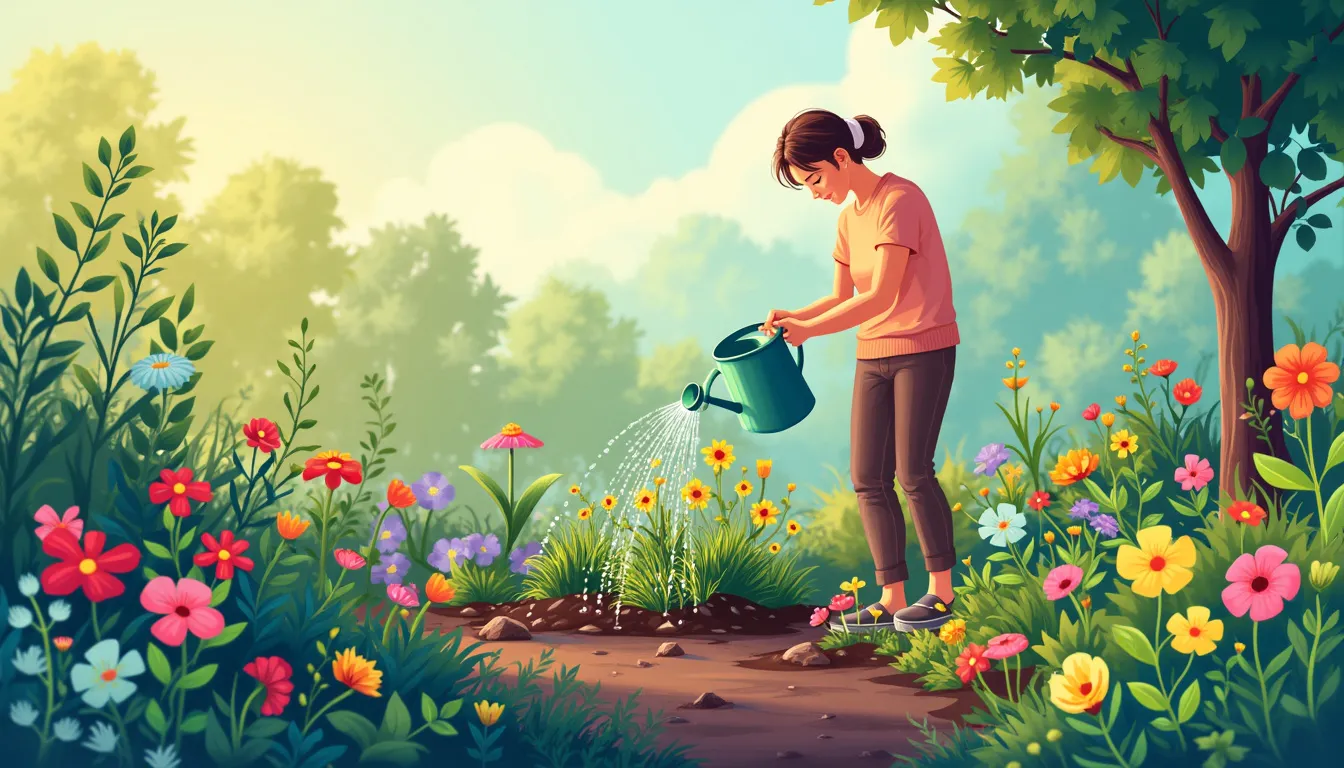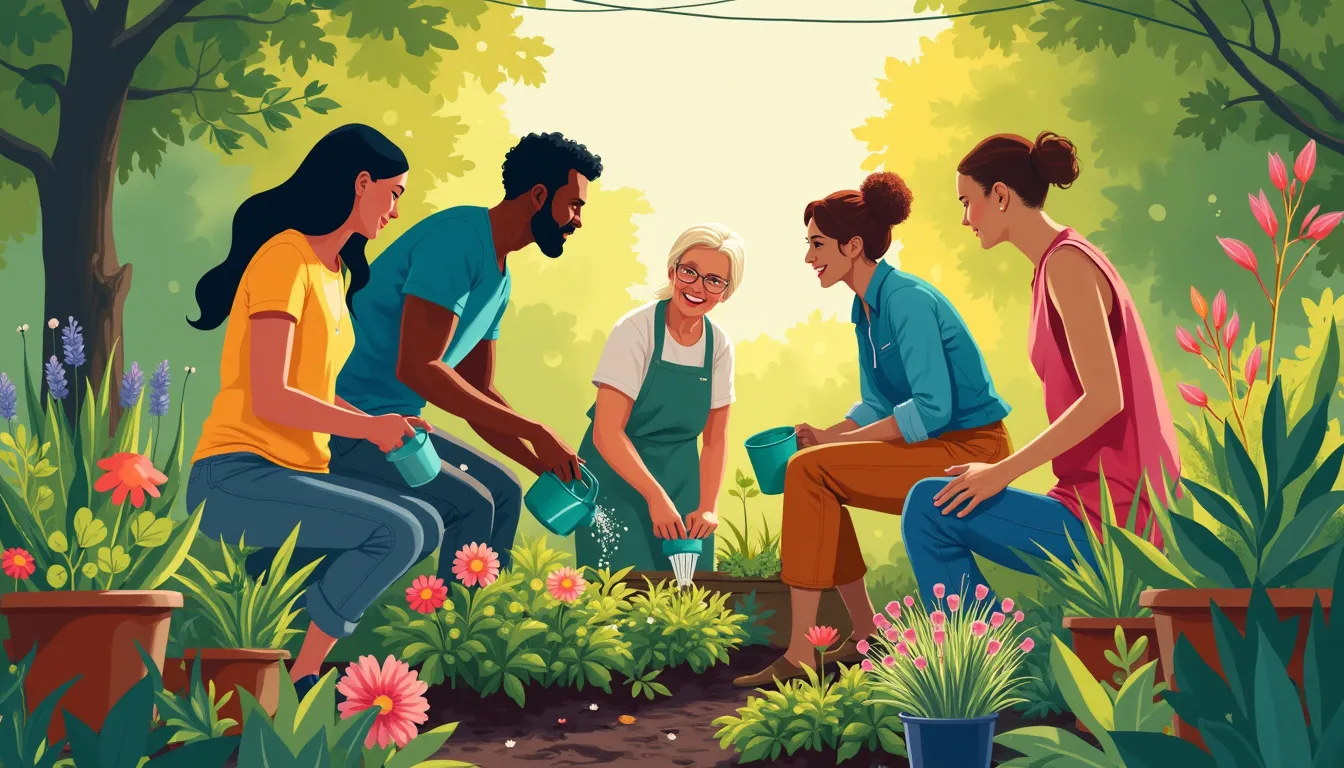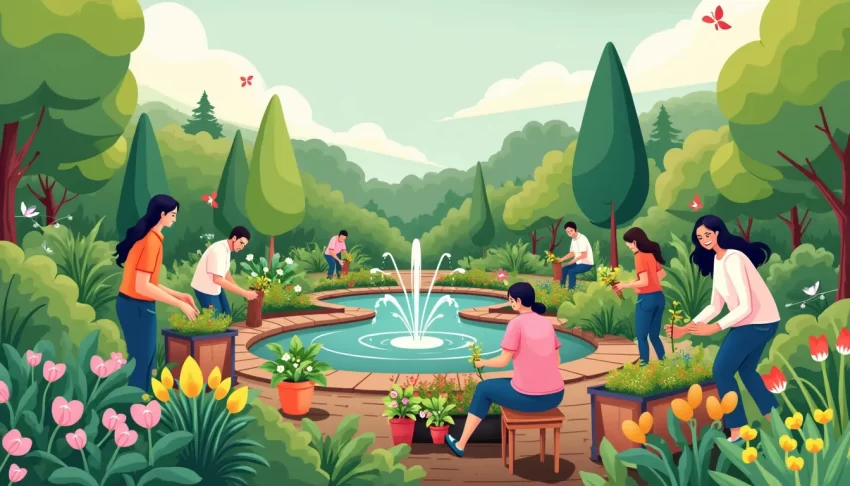Gardening as a form of therapy is a blossoming trend in modern wellness practices, and for good reason. As an intersection of nature, nurture, and creativity, therapeutic horticulture offers a myriad of benefits that extend far beyond simple aesthetics. Whether you’re planting your first seed or revamping a seasoned garden, the act of tending to plants provides profound opportunities for healing and growth. Amidst the hustle and bustle of our daily lives, many individuals are discovering that the tranquility of a garden can serve as a vital sanctuary for both mind and body.
This article delves into the multifaceted ways gardening promotes health and well-being, focusing on its therapeutic advantages. From reducing stress to fostering physical fitness, the benefits of horticulture are as diverse as the plants we cultivate. As you read on, you’ll gain insight into how getting your hands dirty might just be the clean break you need for a healthier, happier you. Whether you’re an experienced green thumb or a novice looking for solace, exploring the healing potential of gardening could be your next step towards a balanced and fulfilling life.
Introduction to Gardening as a Form of Therapy
Gardening as a form of therapy, often called therapeutic horticulture, has burgeoned in popularity as a modern wellness practice. It’s an approach where gardening activities are leveraged to achieve therapeutic goals, such as improving mental health, physical well-being, and social interactions. But what exactly makes this natural, hands-on approach so beneficial?
Therapeutic horticulture is grounded in the belief that human interaction with plants and nature can bring profound healing. This isn’t just a whimsical notion. Clinical studies and anecdotal evidence support how nurturing a garden can elevate mood, reduce stress, and even address symptoms of mental and physical ailments. Imagine the peaceful sensation of fingers in the soil, the bright greenery as a backdrop for mindful meditation, or the satisfaction gleaned from cultivating life. For many, these small acts create significant positive shifts in their daily lives.
The contemporary wellness landscape increasingly recognizes the therapeutic power of nature. Amid hectic schedules, looming deadlines, and the ever-present digital screens, people are seeking solace in nature to regain balance. Whether it’s on the balcony of an urban apartment or in a sprawling backyard, gardening has become a robust antidote to modern life’s incessant hustle.
Why has gardening gained such traction as a form of therapy? It’s partly due to its inclusive accessibility—it’s an activity almost anyone can undertake, regardless of age or physical ability. Additionally, gardening provides a multisensory experience. From the tactile engagement with soil to the visual delight of blooming flowers, every sense is involved. This enriches the therapeutic effect, allowing individuals to connect deeply with themselves and their environment.
Take Sarah, for example. A marketing executive in her mid-30s, Sarah found herself grappling with burnout and anxiety. She turned to therapeutic gardening on a psychologist’s recommendation. Sarah started with a few potted plants on her balcony. Over time, she found immense pleasure in watching her plants flourish. The act of nurturing plants helped her cultivate a sense of purpose and accomplishment, alleviating her stress and improving her mental well-being. Sarah’s journey is a testament to the curative potential embedded in gardening.
This article will delve deeper into the various benefits that gardening as a form of therapy offers, highlighting how this outwardly simple activity can have profound impacts on mental and physical health, social interactions, and cognitive abilities. By weaving through evidence-based findings and personal narratives, we aim to offer a comprehensive guide on how to harness the healing power of gardening. Stay tuned to discover more about how this age-old practice can lead to modern-day well-being.

Mental Health Benefits of Therapeutic Gardening
In recent years, the practice of gardening as a form of therapy has blossomed into a popular activity for fostering mental well-being. One of the primary advantages of engaging in therapeutic gardening is its ability to significantly reduce stress and promote relaxation. Many studies have shown that spending time in nature, tending to plants, and nurturing growth can lower cortisol levels, the hormone associated with stress.
For instance, consider Sarah, a busy professional in a high-paced corporate environment. She started gardening during weekends to cope with her overwhelming schedule. By dedicating a few hours each week to planting and maintaining her garden, she found a serene escape from her daily stresses. The repetitive, mindful actions of digging, planting, and watering provided her with a meditative experience that cultivated inner peace and calm.
Beyond stress reduction, gardening has proven beneficial in alleviating symptoms of depression and anxiety. Engaging in horticultural activities can serve as a natural antidepressant. The act of caring for living things and observing their growth over time fosters a sense of responsibility and accomplishment. Furthermore, exposure to sunlight while gardening stimulates the production of serotonin, a hormone responsible for mood stabilization.
Take, for example, John, who struggled with chronic anxiety and depression. His therapist recommended incorporating gardening into his daily routine. By starting small with a few potted plants and eventually expanding to a full vegetable garden, John noticed a gradual improvement in his mental health. The routine interaction with nature, combined with the physical activity of gardening, provided him with a tangible sense of purpose and achievement that traditional therapy sometimes lacked.
Not only does gardening help mitigate depression and anxiety, but it also contributes to an overall improvement in mood and mental well-being. Horticulture has a unique way of connecting individuals to the earth, leading to profound positive changes in their emotional state. The sensory experiences of touching soil, smelling flowers, and listening to the rustle of plants in the breeze create a multi-sensory environment that is inherently soothing.
Moreover, the impact of gardening extends to individuals managing conditions like ADHD and OCD. For instance, I have personally experienced the incredible benefits of integrating gardening into my routine. As someone managing ADHD and OCD, gardening has provided an outlet for my excess energy and a structured activity that aligns with my need for order. Planting seeds, pruning plants, and arranging flowerbeds have become therapeutic rituals that help to channel my focus and reduce intrusive thoughts.
One particularly interesting facet of gardening therapy is how it instills a sense of mindfulness. Unlike the digital distractions of modern life, gardening requires an attentive presence, allowing individuals to immerse themselves entirely in the task at hand. This immersion can lead to a state of flow, where time seems to vanish, and worries dissipate, resulting in a rejuvenated mind.
In practical terms, the next time you feel overwhelmed, consider stepping out into a garden or starting one if you don’t already have access. Begin with simple, manageable tasks, such as tending to a small herb garden on your windowsill or planting a few flowering plants in your backyard. The key is consistency and allowing yourself to derive joy from the process without the pressure of perfection.
By participating in gardening as a form of therapy, individuals can unlock a treasure trove of mental health benefits. Through reduced stress, alleviation of depression and anxiety symptoms, and an overall boost in mood, therapeutic gardening offers a holistic approach to enhancing mental well-being. And while it may not solve all life’s challenges, this verdant practice can certainly plant the seeds of a healthier, happier mind.

Physical Health Advantages of Gardening
In the realm of gardening as a form of therapy, the physical health benefits are as abundant as the plants we cultivate. Engaging in gardening tasks not only enhances physical fitness and coordination but also provides significant advantages for seniors and individuals with physical disabilities. Moreover, the positive impact on cardiovascular health and the immune system makes it an all-encompassing activity for promoting holistic health.
Enhancement of Physical Fitness and Coordination
Gardening activities are inherently physical and involve a range of movements that contribute to overall fitness. Simple tasks such as digging, planting, weeding, and watering combine to offer a low-impact workout. These activities help in building muscle strength, improving hand-eye coordination, and boosting motor skills. For instance, lifting plant pots or wielding a hoe provides resistance training that can tone muscles, while the repetitive motions required for tasks like raking or pruning can enhance joint flexibility and endurance.
Take Jane, a 45-year-old office worker who spends most of her day sitting at a desk. She found that her sedentary lifestyle was contributing to weight gain and general physical stiffness. However, once she took up gardening, Jane noticed an improvement in her overall fitness. The bending, stretching, and lifting involved in her gardening routine served as a dynamic form of exercise that helped her shed extra pounds and regain flexibility.
Benefits for Seniors and Those with Physical Disabilities
Gardening can be particularly beneficial for seniors and individuals with physical disabilities, offering a form of exercise that is adaptable to various levels of ability. Raised garden beds, container gardening, and ergonomic tools make it accessible for those who may have reduced mobility. These adaptations enable them to enjoy the physical and mental benefits of gardening without putting undue strain on their bodies.
Consider the story of John, a 70-year-old retiree with arthritis. Unable to participate in high-impact exercises, John found joy and therapeutic value in gardening. By using raised beds and lightweight tools, he manages to tend to his garden without exacerbating his condition. The gentle physical activity helps to keep his joints flexible and reduces stiffness, while the sense of accomplishment and connection to nature provides invaluable mental relief.
Positive Impact on Cardiovascular Health and Immune System
Regular gardening sessions contribute to cardiovascular health by increasing heart rate through sustained physical effort. Activities such as digging, hoeing, and even trekking back and forth across the garden act as moderate-intensity exercises that enhance heart and lung function. These activities not only help in maintaining a healthy weight but also reduce the risk of heart disease, stroke, and other cardiovascular issues.
Furthermore, gardening exposes individuals to fresh air and sunlight, which are vital for overall well-being. Sunlight is a primary source of Vitamin D, essential for bone health, and has been shown to boost the immune system. Fresh air, combined with the physical activity of gardening, aids in increasing lung capacity and reducing respiratory issues.
For example, Sarah, a nurse working long hours in a hospital, found that spending time in her garden after a grueling shift was more than just a way to unwind. The physical activity of gardening, coupled with the exposure to fresh air and sunlight, significantly improved her cardiovascular health and immune system. Sarah rarely falls sick, attributing her robust health to the consistent, moderate exercise and the therapeutic benefits of her gardening routine.
In conclusion, gardening as a form of therapy provides a multifaceted approach to improving physical health. Whether through enhancing physical fitness and coordination, offering adapted gardening for seniors and those with disabilities, or positively impacting cardiovascular health and the immune system, the physical benefits of gardening are profound and far-reaching. As more people discover these advantages, gardening will continue to blossom as a cornerstone of holistic wellness practices.

Social and Cognitive Benefits of Gardening Therapy
Gardening as a form of therapy extends beyond individual well-being to encompass social and cognitive benefits that are equally transformative. Engaging in horticultural activities offers a rich tapestry of opportunities to foster community connections, stimulate cognitive functions, and cultivate practical skills. These aspects collectively contribute to a holistic sense of healing and personal development.
Building Social Connections Through Community Gardens
One of the most heartwarming elements of gardening as a form of therapy is its innate ability to bring people together. Community gardens serve as fertile grounds for building meaningful social connections. These spaces offer a communal environment where individuals from diverse backgrounds can collaborate, share experiences, and support one another. For instance, a community garden project in an urban neighborhood might involve regular meetings, communal planting days, and harvest festivals, creating a sense of camaraderie and belonging among participants.
Research underscores the social benefits of community gardens, highlighting how these shared spaces can reduce feelings of isolation and loneliness. According to a study published in the Journal of Public Health, individuals who participate in community gardening report higher levels of social interaction and a greater sense of community engagement. This social fabric woven through gardening activities not only enhances emotional well-being but also builds stronger, more resilient communities.
Cognitive Stimulation and Memory Improvement
The cognitive benefits of gardening as a therapy are profound, particularly for individuals seeking to maintain or improve their mental acuity. Gardening tasks such as planning a garden layout, selecting appropriate plants, and managing seasonal planting schedules require critical thinking and problem-solving skills. These activities stimulate the brain, fostering cognitive engagement that can enhance memory and cognitive function.
For example, a study conducted by the Texas A&M University AgriLife Extension revealed that horticultural therapy can be beneficial for individuals with dementia and other cognitive impairments. Participants in the study who engaged in regular gardening activities showed improvements in both short-term memory and attention spans. This therapeutic practice offers a non-pharmacological approach to cognitive health, emphasizing active participation and continuous learning.
Development of New Skills and Increased Self-Efficacy in Gardeners
Gardening as a form of therapy is also a powerful avenue for skill development and the enhancement of self-efficacy – the belief in one’s ability to execute tasks and achieve goals. Engaging in gardening activities allows individuals to acquire new knowledge and horticultural skills, from understanding plant biology to mastering techniques such as pruning and composting. These newly developed proficiencies not only foster a sense of accomplishment but also contribute to ongoing personal growth.
Consider the journey of a novice gardener who starts with a small windowsill herb garden and gradually progresses to managing a larger plot in a community garden. Over time, this individual gains expertise in various horticultural practices, experiences the joy of nurturing plants from seed to harvest, and builds confidence in their abilities. This progression underscores the therapeutic value of gardening, illustrating how the steady accrual of skills can bolster self-esteem and self-worth.
Moreover, gardening presents numerous opportunities for creative expression, whether through designing garden layouts, selecting colorful plant pairings, or crafting unique garden decorations. This creative outlet can be particularly beneficial for individuals who may struggle with traditional forms of self-expression, offering a tangible and rewarding way to channel their creativity.
By integrating gardening as a form of therapy into wellness practices, individuals can reap a multitude of social and cognitive benefits. The communal aspects of gardening foster relationships and a sense of belonging, while the cognitive challenges stimulate mental functions and promote lifelong learning. Additionally, the acquisition of new skills and enhanced self-efficacy contribute to personal empowerment and overall well-being. As such, gardening stands out as a multifaceted therapeutic activity that nurtures both the mind and the soul.
As we conclude our exploration into gardening as a form of therapy, it becomes abundantly clear that the simple act of tending to plants can sow the seeds for profound healing. From the mental tranquility derived from the rhythmic planting and watering of seeds to the physical vigor gained from hours spent lovingly cultivating a garden, horticulture offers myriad therapeutic benefits. The reduction of stress and the alleviation of depressive symptoms are just the beginning; gardening cultivates a unique sense of calm and purpose that many modern wellness practices strive to achieve.
Moreover, the physical advantages are not to be overlooked. As we’ve discussed, gardening tasks enhance physical fitness, improve coordination, and offer remarkable benefits for seniors and those with physical disabilities. The cardiovascular and immune system boosts that come with regular gardening further underscore its role as a holistic health activity, marrying physical wellness with mental peace.
On a social and cognitive level, therapeutic gardening fosters community connections and stimulates cognitive function, offering gardeners a sense of belonging and purpose. The development of new skills and the reinforcement of self-efficacy reflect how gardening can be both a personal and communal journey to well-being.
In a world that increasingly seeks digital solutions for physical and mental wellness, there is profound wisdom in returning to the earth. Gardening reminds us to slow down, breathe deeply, and reconnect with the natural world—a combination that leads to resilience and healing. So why not pick up a spade, plant a seed, and embark on your own journey toward therapeutic wellness? The garden awaits, with countless rewards ready to bloom.
Support Us: Check out our recommended products on Amazon.

